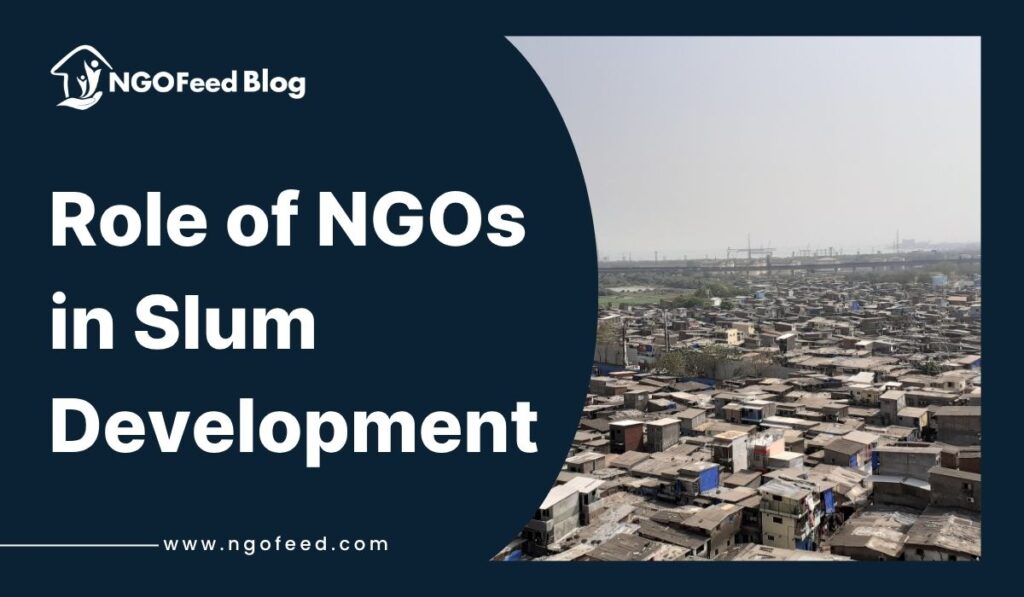Role of NGOs in Slum Development: NGOs’ Role in Slum Growth Typically lacking fundamental amenities including clean water, sewage, education, healthcare, and housing, slums are heavily populated and underdeveloped urban areas. In India and other developing countries, urbanization, poverty, and poor urban planning are all intimately linked to the expansion of slums. Non-governmental organizations (NGOs) are critical, transformational players by acting as bridges between the state and the underprivileged communities even as governments fight to handle the difficult problems of slums.
Table of Contents
Also Read: NGO in Women Empowerment
Role of NGOs in Slum Development
1. Regular Service Delivery
Delivery Frequently inserting themselves where governmental services are limited or non-existent, NGOs provide:
- Facilities for cleanliness, drinking water
- Waste management solutions
- Mobile clinics and health camps
- Economically viable housing alternatives
- Eligibility for cheap food and hygiene goods.
These solutions immediately elevate the standard of life of slum dwellers.
Also Read: Poverty Alleviation And Development
2. Skill and Education Development
Development Breaking the circle of poverty depends much on education. NGOs concentrate on:
- Creating informal schools, tuition facilities, and early childhood education.
- Giving digital literacy, vocational education, and job placement support.
- Giving young people and adults the tools they need to enter the official economy will empower them.
Pratham’s urban education projects and the Smile Foundation’s mobile school efforts are among the examples.
3. Nutrition and Health
NGOs Operate:
- Malnutrition eradication campaigns targeting particularly pregnant women and children.
- Giving of nutritional packets, clean water, and sanitary pads
- Preventable illnesses are greatly decreased, and general well-being is enhanced by these initiatives.
4. Legal Aid and Identity Documentation
Slum residents cannot obtain government subsidies absent documentation. NGOs support:
- Get birth certificates, ration cards, voter ID, and Aadhaar cards.
- Provide legal assistance for eviction protection, domestic violence incidents, and property rights.
- Help with registering Self-Help Groups (SHGs) or other community-based groups.
Also Read: Role of NGOs in NGOs in Urban Development
5. Women’s Empowerment and Gender Equity
Focused activities for non-governmental organizations include:
- Training for women in vocation
- Awareness about domestic violence, reproductive rights, and health
- Organization of women-led self-help groups for savings and microbusiness.
This improves women’s social and financial position in impoverished neighborhoods.
6. Advocy and Political Influence
NGOs speak for slum residents by:
- Recording problems and requesting improved services from local administrations.
- Taking part in stakeholder meetings and urban policy discussions.
- Advocating for inclusive urban development and slum betterment initiatives.
Their local understanding informs the design of more fair urban growth plans.
Also Read: Vital Role of NGOs in Modern Society
7. Citizen Involvement and Community Organizing
Most successful slum improvement initiatives involve:
- Community-based strategy
- Encouraging civic participation through neighborhood committees and young groups.
Among slum residents, NGOs create trust and ownership, both of which are essential for long-lasting transformation.
8. Resilience to Climate Change and Risk Reduction in Disaster
Climate-related disasters make slums quite exposed. Non-governmental groups:
- Educate disaster preparedness among locals.
- Promote infrastructure and houses that are climate resistant.
- Work on urban farming, rainwater collecting, and green areas.
These initiatives improve environmental challenge resilience and adaptability.
Research of Case Studies
- In Mumbai, SPARC (Society for the Promotion of Area Resource Centers) collaborates with slum inhabitants on housing and hygiene.
- Health, education, and women’s empowerment are the main emphasis of Delhi’s Asha Society.
- Goonj links urban excess with rural and slum growth via dignity-based community development.
- Works on urban living, young employability, and house improvement: Saath Charitable Trust, Ahmedabad.
Also Read: Role of UNESCO in Women Empowerment
Challenges Nonprofits Have to overcome
- Inadequate permanent financial support
- Slow urban policy change and bureaucratic impediments
- Resistance from landlords or local political actors
- Problems in expanding models without sacrificing influences.
Recommendations
- Better NGOs, private companies, and government collaboration.
- Governmental acknowledgement and inclusion of NGO activity in urban strategies.
- Mapping and service delivery aided by technology.
- Participatory techniques and ongoing community inputs.
Also Read: Role Of NGOs in Psychological Support After Tragedies
Conclusion
NGOs serve as accelerators for inclusive, participatory, and environmentally friendly slum development. With creative support and cooperation structures, NGOs may keep converting slums into dignified, habitable communities, so guaranteeing no one is left behind in the path of urban growth. They provide adaptability, creativity, and human-centered solutions to issues frequently ignored in official urban governance.

